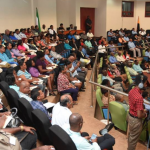
The United States Agency for International Development (USAID) has released the final report for the Democracy, Human Rights and Governance Assessment for Guyana.
According to the US Embassy in Georgetown, The assessment was conducted to examine political change and democratization in Guyana, analyze core democracy and governance issues, actors, and institutions in the country and develop strategic and programmatic recommendations to address the further development of democracy and governance.
According to the report, there is now a window of opportunity in Guyana to support the reform process and build momentum for the process currently underway that can strengthen Guyana’s governance, balance the power of the executive, start the devolution of power to local government, and ensure a more accountable and responsive government.
It said “the democratic reforms, if adopted and implemented, can address the over-centralization of power, politicized and nonperforming institutions that were found during the assessment, and increase governance effectiveness and responsiveness.”
The assessment has recommended that USAID focuses on constitutional reform, strengthening Guyana’s checks and balances, and on devolution and local governance, adding that in the immediate term, this should be done by focusing on the reform processes, oversight mechanisms, information flow, and newly elected local authorities.
“In the medium to long term, it should be done by reinstating a DRG program in Guyana that can make a substantive contribution to strengthening Guyana’s democratic institutions and systems.”
The assessment has pointed out that the democratic reforms through constitutional reform, strengthened checks and balances, and strengthened devolution and local governance within the window of opportunity that is now open, “will address structural issues of the over-centralization of power and politicized and underperforming institutions. This will reduce the power of the executive, strengthen critical oversight mechanisms, increase the ability of state institutions and local government to function without political interference, and bring government closer to the people. This in turn will increase government effectiveness and responsiveness.”
But the assessment team warns that the window of opportunity will close within the next 18 to 24 months, as focus will shift then to the next local government and general elections.
The embassy said that during the conduct of the assessment, the team met with representatives within the three branches of government—the executive, the legislature and the judiciary.
It noted that interviews were also conducted with a broad array of Guyanese leaders and experts, sub-national and local level representatives and members of civil society to gain their perspectives on democracy and governance in Guyana and devise concrete recommendations. The interviews were conducted in late 2015.
The report has found that in the early days of the new government, there was the feeling by many across the country that the change they may have voted for, did not come, as Ministers gave themselves a 50% salary increase while public servants await a significant increase.
It also pointed to campaign promises that remain unfulfilled. However, the assessment also noted that the election of the multi party, multi ethnic coalition, could see real change coming to Guyana, once there are reforms and proper engagement at every level.











You must be logged in to post a comment Login